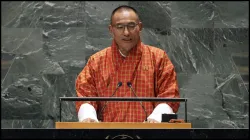'Relic of the past': Bhutan, Portugal support India's permanent membership of UN Security Council | WATCH
Bhutan PM Tshering Tobgay referred to the UN Security Council as a "relic of the past" that did not represent the current geopolitical landscape. India's long-time efforts for a permanent seat in the Council has received backing from the US, France and Britain as well.

New York: After receiving endorsements from the United States, France and Britain, India's bid for permanent membership of the United Nations Security Council has also received backing from Bhutan and Portugal during the 79th Session of the UN General Assembly. This has led to a growing demand to increase the number of permanent members to reflect the contemporary global reality.
While addressing the Assembly on Friday, Bhutan's Prime Minister Tshering Tobgay said India with its significant economic growth and leadership of the Global South deserves a permanent seat at the Security Council. He also expressed “deepest” gratitude to India for its “support and friendship” for Bhutan's journey of graduating from the Least Developed Countries (LDC) category.
“The United Nations must evolve to meet the realities of today's world. The Security Council, as it stands, is a relic of the past. We need a Council that reflects the current geopolitical, economic landscape and social realities,” Tobgay said in his address to the UN General Assembly on Friday. He also voiced support for Japan, “a leading donor and peacebuilder”, to become a permanent UNSC member.
Portugal backs India's permanent UNSC membership
Earlier, Portuguese Prime Minister Luís Montenegro underlined the urgent need to reform the UN Security Council to ensure greater representativity and effectiveness. "We uphold a reform process for the UN Security Council that will make it more representative, agile, and functional. Its composition is out of date and the absence of some regions hinders its functioning," he noted, adding that it is essential to adapt this body to contemporary geopolitical reality.
He said reforming the Security Council must also include expanding representativity, including countries such as Brazil and India as permanent members and strengthening the role of small and medium-sized countries, including small Island states. He underscored that the veto can no longer be used in a disproportionate manner by powers engaged in conflicts.
What did other countries say on the matter?
While addressing the 79th Session of the UN General Assembly, British PM Keir Starmer said, "If we want the system to deliver for the poorest and most vulnerable then their voices must be heard. We need to make the system more representative and more responsive to those who need it most. So we will make the case not just for fairer outcomes, but fairer representation in how we reach them."
"This also applies to the Security Council. It has to change to become a more representative body, willing to act – not paralysed by politics. We want to see permanent African representation on the Council, Brazil, India, Japan and Germany as permanent members, and more seats for elected members as well," he added.
This came after French President Emmanuel Macron called for making the UN more efficient and representative. "That's why," he said, "France is in favour of the Security Council being expanded. Germany, Japan, India, and Brazil should be permanent members, as well as two countries that Africa will decide to represent it."
During a bilateral meeting between US President Joe Biden and Prime Minister Narendra Modi last week, Biden shared with the Indian PM that the US supports initiatives to reform global institutions to reflect India’s important voice, including permanent membership for India in a reformed UN Security Council. The leaders also voiced their view that a closer US-India partnership is vital to the success of efforts to build a cleaner, inclusive, more secure, and more prosperous future for the planet.
India's call for permanent seat in UNSC
India has been at the forefront of efforts at the UN to push for urgent long-pending reform of the Security Council, emphasising that it rightly deserves a place at the UN high table as a permanent member. India argues that the 15-nation council founded in 1945 is not fit for purpose in the 21st Century and does not reflect contemporary geo-political realities.
At present, the UNSC comprises five permanent members and 10 non-permanent member countries which are elected for a two-year term by the General Assembly of the United Nations. The five permanent members are Russia, the UK, China, France and the United States and these countries can veto any substantive resolution. India last sat at the UN high table as a non-permanent member in 2021-22.
(with agency input)
ALSO READ | 'Willing to act': After US and France, UK backs India's permanent membership in UN Security Council